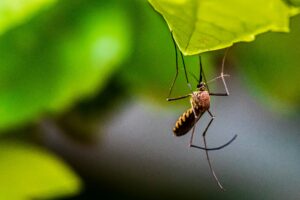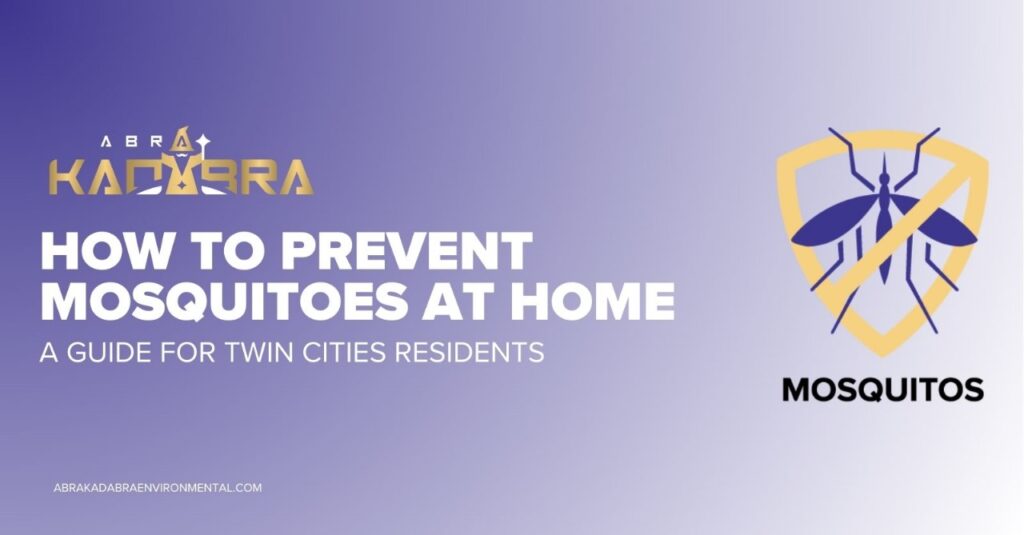Mosquitoes kill more people than any other creature in the world, spreading diseases like Malaria, Dengue, West Nile, Yellow Fever, Zika, Chikungunya, and Lymphatic Filariasis. This is according to a report published in April 2024 by the Centers for Disease Control and Prevention in April 2024.
As of May 2024, CBS News reported an increase in Mosquito numbers in the Minnesota Metro Area, which has risen above average, according to the Metropolitan Control District. This occurrence was similar to what happened in 2023 when a high number of mosquitoes hatched in the spring, but a summer drought led to a low mosquito count for the rest of the year.
The high mosquito areas are in Anoka County, Carver County, northern Washington County, and northern Dakota County. Black flies are abundant in the typical hot spots along rivers and streams.
Mosquitos are called Minnesota’s unofficial state bird due to their high number and abundant rainfall in April and May. But what is the cause of this?
What are the causes of mosquitos?

Mosquitoes belong to the family of Culicidae and are found worldwide. As mentioned earlier in this article, they can be deadly due to their ability to transmit diseases. But what causes mosquitoes to multiply in populations?
Breeding Habitats
The number one cause of mosquitoes is the places that allow them to breed and multiply. These areas turn into breeding sites for mosquitoes, such as ponds, marshes, swamps, puddles, containers, and other places with stagnant water. Moreover, it is also most common for mosquitoes to multiply and breed on natural water sources such as rivers, lakes, and streams, especially in slow-moving or stagnant sections.
Climate and Weather Conditions
Like other species, Mosquitoes have a specific temperature range where they can live. These are places with warm and humid conditions. Mosquitoes are most active in tropical and subtropical regions but can also be found in temperate zones during the warmer months. Whenever there is high humidity, Mosquitoes find it helpful to maintain the moisture needed for their eggs and larvae to develop.
Human Activities
Urbanization, agriculture, and deforestation are man-made activities that contribute to mosquito breeding habitats. Urban areas with poor drainage systems often have clogged gutters, discarded containers, and other materials that can hold water and serve as breeding sites for mosquitoes. In agricultural areas, irrigation and rice paddies can have stagnant water, whereas mosquitoes can have a breeding ground. Lastly, deforestation contributes to the increasing number of mosquitoes due to the alteration of natural habitats, which brings mosquitoes closer to humans.
Biological Factors
Unfortunately, Mosquitoes are the kind of species that have demonstrated resistance. They thrive in diverse environments ranging from urban areas to remote forests. They are versatile, so it is no wonder they can be everywhere without pest control. Due to their rapid reproductive cycle, female mosquitoes can lay hundreds of eggs simultaneously, resulting in faster population growth under favorable conditions.
Lack of Mosquito Control
We are no strangers to attempting to prevent mosquito population growth. But sometimes, we lack knowledge about finding the right pest control provider or products to create sustainable ways to avoid mosquitoes.
Global Factors
The climate crisis has been our biggest concern for the past and future years. The rise in global temperatures and changing weather patterns are expanding mosquitoes’ geographical range, allowing them to inhabit new areas and potentially increasing the transmission of mosquito-borne diseases. Moreover, global travel and trade contribute to spreading mosquitoes to regions where they previously did not exist. In that case, mosquitoes are getting more widespread across countries and continents.
Where can you find mosquitoes?

In science class, you must have known that Mosquitoes are most commonly found in areas with stagnant water – this is their breeding ground where they can lay their eggs.
Tropical and subtropical regions
Places with warm and humid climates are where you can commonly find mosquitoes. Regions based near the equator, such as Africa, Southeast Asia, and Central and South America, are where populations of mosquitoes are primarily abundant.
Wetlands and Marshes
These areas can be an abundant source of standing water which can be a breeding ground for mosquitoes.
Stagnant Water Sources
If you live near a lake, pond, swamp, or ditch, there’s a huge chance that mosquitoes are currently breeding there. This includes both natural and man-made water sources.
Forested Areas
Areas with plenty of moisture create a significant mosquito population, including forests with tropical and temperate climates.
Rice Fields and Agricultural Areas
Planting rice and other crops requires an irrigation system built around them. That irrigation system can house mosquito breeding.
Residential Areas
Homes can be high-risk areas for mosquito breeding, specifically in gardens, yards, and anywhere water can accumulate. If you have containers like flower pots, birdbaths, and rain barrels, that’s where the mosquitoes flying around your home breed.
How to prevent mosquitoes at home

Now that we’ve discussed the causes of Mosquitoes, here are some actionable steps to prevent them from laying eggs inside and outside your home.
Eliminate Breeding Grounds
We’ve talked about how mosquitoes will always find their way into the sneakiest part of your home to create a breeding ground. As a homeowner, you should take the initiative to regularly inspect your yard and indoor areas for any stagnant water in containers like flowerpots, birdbaths, pet water dishes, and children’s toys. Once you find them, you should immediately clean and empty them. Next is to ensure gutters are clear of debris to prevent water from pooling, which can serve as breeding sites. Inside your home, check for leaks and areas where water may accumulate, such as under sinks and bathrooms. Removing these water sources significantly reduces the possibility for mosquitoes to reproduce outdoors and indoors.
Landscaping and Indoor Plant Care
Plants indoors and outdoors add beauty to a home, but as a homeowner, you should religiously maintain them to prevent mosquitoes from housing them. One step you can take is to keep your lawn vegetation trimmed, as mosquitoes rest in tall grass, weeds, and overgrown bushes. Incorporating mosquito-repellent plants such as citronella, marigolds, lavender, and basil into your garden can also help these pests away. These plants can emit unpleasant scents to mosquitoes, making your yard and home less inviting habitats for them.
Use Repellants
Using mosquito repellents is one of the most influential and easiest ways to keep mosquitoes away. But are you doing it right? Or are you choosing the right service provider? For sure, some of you have heard about outdoor sprays and foggers that are applied to shaded areas and around the perimeter of your yard, following the manufacturer’s instructions for safe use. You can use plug-in mosquito repellents or essential oil diffusers with eucalyptus or lavender for indoor care. Moreover, citronella candles and tiki torches can create a mosquito-free zone in outdoor settings. These above-mentioned are primarily low-impact and less sustainable, but these can be helpful for now. We highly recommend calling a pest control service provider to keep mosquitoes away long-term.
Natural Predators and Indoor Pets
For animal lovers, this is your time to create more reasons to adopt a pet to your non-animal lover family member. You can use stocking ponds with mosquito-eating fish like goldfish, koi, or guppies, which will consume mosquito larvae. You can keep your fur babies like cats or dogs, but just make sure to clean their water bowls regularly.
Mechanical Barriers
Some of you may also consider installing screens on doors and windows to prevent mosquitoes from entering your home. You can use mosquito nets over seating areas or patios to create a physical barrier against mosquitoes in outdoor areas. You can consider having bed nets to keep your bedtime peaceful and away from mosquitoes.
How Abra Kadabra Can Help
Abra Kadabra offers a variety of options for mosquito and tick control. We are proud to offer expanded options, allowing homeowners to contribute to protecting our wetlands while simultaneously protecting their families and pets from mosquito hordes. Treatment begin and end dates are weather-dependent but typically run from May through September.
Mosquito & Tick Control Plans Include Multiple Treatment Options
- Our innovative process includes: an inspection of your yard during each service
- Specialized treatment of standing water to prevent reproduction
- Protection all season
- Eco-friendly approach protects your yard while preserving our environment
- Green/Low Impact treatments
- Larvicide water treatment briquettes where appropriate
Benefits of Mosquito & Tick Control Plan
- Make yard enjoyable, limit bites
- Decrease food source for spiders
- Protect family and pets from bites and disease
- Low-impact options protect the environment
Wrapping It Up
Always remember that Mosquitoes are dangerous. They may be small and, sometimes, not visible to the naked eye, but their bite can lead to several fatal diseases. By having an extended knowledge about them, you are taking a huge step in protecting yourself and your loved ones from the harm that can be caused by mosquitoes. Mosquitoes are just one of the 18 typical pests found in your home. Make sure your family is protected.
At Abra Kadabra, we believe every customer is a customer for life.
Our job is to provide homeowners with the highest level of protection, giving you back your time and peace of mind. We understand that when customers feel that we care and give them the time and attention necessary to solve their problems, they feel the most confident in how their home is being taken care of. Our technicians have been trained at the highest level because knowledge is power, and that power is truly our magic.
Abra Kadabra Environmental Services
CORPORATE OFFICE LOCATION
2642 Commerce Blvd, Mound, MN 55364
NORTH METRO LOCATION
531 Lake St S, Forest Lake, MN 55025
763-573-0330
Give us a call. Experience our magic firsthand.

